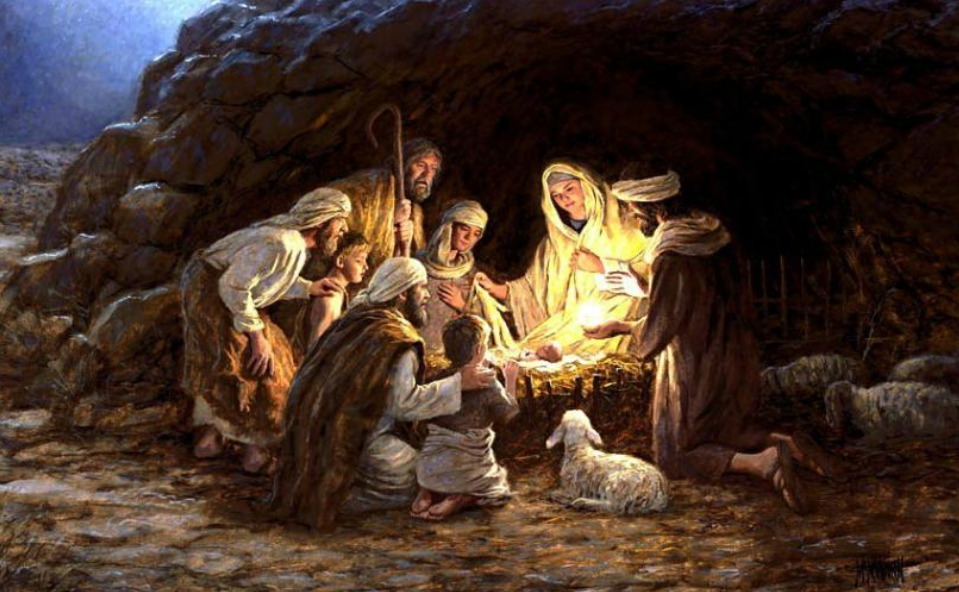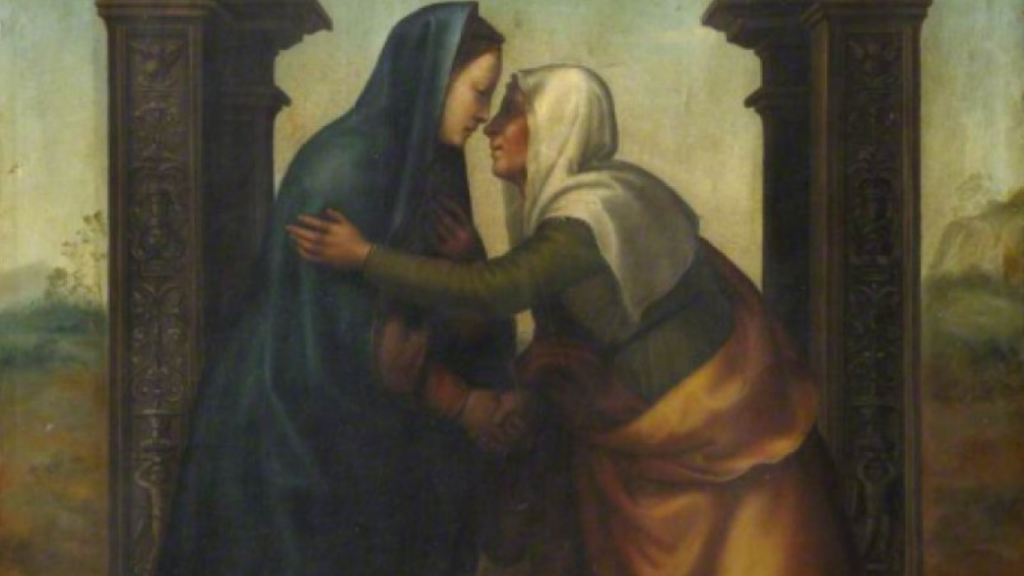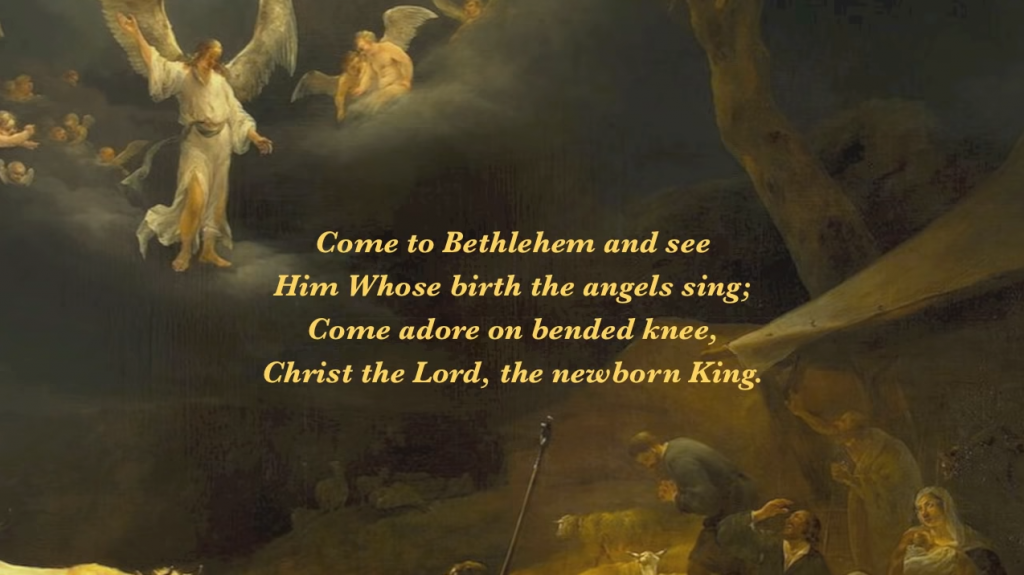
Editor’s note: The following is extracted from Sermons on National Subjects, by Charles Kingsley (published 1890). All spelling in the original.
FOURTH SUNDAY IN ADVENT
Rejoice in the Lord always. – Philippians iv. 4.
This is the beginning of the Epistle for to-day, the Sunday before Christmas. We will try to find out why it was chosen for to-day, and what lesson we may learn from it.
Now Christmas-time was always a time of rejoicing among many heathen nations, and long before the Lord Jesus Christ came. That was natural and reasonable enough, if you will consider it. For now the shortest day is past. The sun is just beginning to climb higher and higher in the sky each day, and bring back with him longer sunshine, and shorter darkness, and spring flowers, and summer crops, and a whole new year, with new hopes, new work, new lessons, new blessings. The old year, with all its labours and all its pleasures, and all its sorrows and all its sins, is dying, all but gone. It lies behind us, never to return. The tears which we shed, we never can shed again. The mistakes we made, we have a chance of mending in the year to come. And so the heathens felt, and rejoiced that another year was dying, another year going to be born.
And Christmas was a time of rejoicing too, because the farming work was done. The last year’s crop was housed; the next year’s wheat was sown; the cattle were safe in yard and stall; and men had time to rest, and draw round the fire in the long winter nights, and make merry over the earnings of the past year, and the hopes and plans of the year to come. And so over all this northern half of the world Christmas was a merry time.
But the poor heathens did not know the Lord. They did not know who to thank for all their Christmas blessings. And so some used to thank the earth for the crops, and the sun for coming back again to lengthen the days, as if the earth and sun moved of themselves. And some used to thank false gods and ancient heroes, who, perhaps, never really lived at all. And some, perhaps the greater number, thanked nothing and no one, but just enjoyed themselves, and took no thought, as too many do now at Christmas-time. So the world went on, Christmas after Christmas; and the times of that ignorance, as St. Paul says, God winked at. But when the fulness of time was come, He sent forth His Son, made of a woman, to be the judge and ruler of the world; and commanded all men everywhere to repent, and turn from all their vanities to serve the living God, who had made heaven and earth, and all things in them.
He did not wish them to give up their Christmas mirth. No: all along He had been trying to teach them by it about His love to them. As St. Paul told them once, God had not left Himself without witness, in that He gave them rain and fruitful seasons, filling their hearts with joy and gladness.
God did not wish them, or us, to give up Christmas mirth. The apostles did not wish it. The great men, true followers of the apostles, who shaped our Prayer-book for us, and sealed it with their life-blood, did not wish it. They did not wish farmers, labourers, servants, masters, to give up one of the old Christmas customs; but to remember who made Christmas, and its blessings; in short, to rejoice in The Lord. Our forefathers had been thanking the wrong persons for Christmas. Henceforward we were to thank the right person, The Lord, and rejoice in Him. Our forefathers had been rejoicing in the sun, and moon, and earth; in wise and valiant kings who had lived ages before; in their own strength, and industry, and cunning. Now they were to rejoice in Him who made sun, and moon, and earth; in Him who sent wise and valiant kings and leaders; in Him who gives all strength, and industry, and cunning; by whose inspiration comes all knowledge of agriculture, and manufacture, and all the arts which raise men above the beasts that perish. So their Christmas joys were to go on, year by year while the world lasted: but they were to go on rightly, and not wrongly. Men were to rejoice in The Lord, and then His blessing would be on them, and the thanks and praise which they offered Him, He would return with interest, in fresh blessings for the coming year.
Therefore, I think, this Epistle was chosen for to-day, the Sunday before Christmas, to show us in whom we are to rejoice; and, therefore, to show us how we are to rejoice. For we must not take the first verse of the Epistle and forget the rest. That would neither be wise nor reverent toward St. Paul, who wrote the whole, and meant the whole to stand together as one discourse; or to the blessed and holy men who chose it for our lesson on this day. Let us go on, then, with the Epistle, line by line, throughout.
“Rejoice in the Lord always, and again I say, rejoice.” As much as to say, you cannot rejoice too much, you cannot overdo your happiness, thankfulness, merriment. You do not know half—no, not the thousandth part of God’s love and mercy to you, and you never will know. So do not be afraid of being too happy, or think that you honour God by wearing a sour face, when He is heaping blessings on you, and calling on you to smile and sing. But “let your moderation be known unto all men.” There is a right and a wrong way of being merry. There is a mirth, which is no mirth; whereof it is written, in the midst of that laughter there is a heaviness, and the end thereof is death. Drunkenness, gluttony, indecent words and jests and actions, these are out of place on Christmas-day, and in the merriment to which the pure and holy Lord Jesus calls you all. They are rejoicing in the flesh and the devil, and not in the Lord at all; and whosoever indulges in them, and fancies them merriment, is keeping the devil’s Christmas, and not Jesus Christ’s. So let your moderation be known to all men. Be merry and wise. The fool lets his mirth master him, and carry him away, till he forgets himself, and says and does things of which he is ashamed when he gets up next morning, sick and sad at heart. The wise man remembers that, let the occasion be as joyful a one as it may, “the Lord is at hand.” Christ’s eye is on him, while he is eating, and drinking, and laughing. He is not afraid of Christ’s eye, because, though it is Divine it is a human, loving, smiling eye; rejoicing in the happiness of His poor, hard-worked brothers here below. But he remembers that it is a holy eye, too; an eye which looks with sadness and horror on anything which is wrong; on all drunkenness, quarrelling, indecency; and so on in all his merriment, he is still master of himself. He remembers that his soul is nobler than his body; that his will must be stronger than his appetite; and so he keeps himself in check; he keeps his tongue from evil, and his stomach from sottishness, and though he may be, and ought to be, the merriest of the whole party, yet he takes care to let his moderation, his sobriety, be known and plain to everyone, remembering that the Lord is at hand.
And that man—I will stand surety for him—will be the one who will rise from his bed next morning, best able to carry out the next verse of the Epistle, and “be careful for nothing.”
Now that is no easy matter here in England; to rich and poor, Christmas is the time for settling accounts and paying debts. And therefore in England, where living is dear, and everyone, more or less, struggling to pay his way, Christmas is often a very anxious, disturbing time of year. Many a family, for all their economy, cannot clear themselves at the year’s end; and though they are able to forget that now and then, thank God, through great part of the year, yet they cannot forget it at Christmas. But, as I said, the man who at Christmas-time will be most able to be careful for nothing, will be the man whose moderation has been known to everyone; for he will, if he has lived the year through in the same temper in which he has spent Christmas, have been moderate in his expenses; he will have kept himself from empty show, and pretending to be richer than he is. He will have kept himself from throwing away his money in drink, and kept his daughters from throwing away money in dress, which is just what too many, in their foolish, godless, indecent hurry to get rid of their own children off their hands do not do.
And he will be the man who will be in the best humour, and have the clearest brain, to kneel down when he gets up to his daily work, and “in everything, by prayer and supplication, make his requests known to God.” And then, whether he can make both ends meet or not, whether he can begin next year free from debt or not, still “the peace of God will keep his heart.” He may be unable to clear himself, but still he will know that he has a loving and merciful Father in heaven, who has allowed distress and difficulty to come on him only as a lesson and an education. That this distress came because God chose, and that when God chooses it will go away—and that till then—considering that the Lord God sent it—it had better not go away. He will believe that God’s gracious promises stand true—that the Lord will never let those who trust in Him be confounded and brought to shame—that He will let none of us be tempted beyond what we are able, but will always with the temptation make a way for us to escape, that we may be able to bear it. And so the peace of God which passes understanding, will keep that man’s mind. And in whom? “In Jesus Christ.” Now what did St. Paul mean by putting in the Lord Jesus Christ’s name there? what is the meaning of “in Jesus Christ”? This is what it means; it means what Christmas-day means. A man may say, “Your sermon promises fine things, but I am miserable and poor; it promises a holy and noble rejoicing to everyone, but I am unholy and mean. It promises peace from God, and I am sure I am not at peace: I am always fretting and quarrelling; I quarrel with my wife, my children, and my neighbours, and they quarrel with me; and worst of all,” says the poor man, “I quarrel with myself. I am full of discontented, angry, sulky, anxious, unhappy thoughts; my heart is dark and sad and restless within me—would God I were peaceful, but I am not: look in my face and see!”
True, my friend, but on Christmas-day the Son of God was born into the world, a man like you.
“Well,” says the poor man, “but what has that to do with my anxiety and my ill-temper?”
It would take the whole year through, my friend, to show you all that it has to do with you and your unhappiness. All the Lessons, Epistles, and Gospels of the year are set out to show you what it has to do with you. But in the meanwhile, before Christmas-day comes, consider this one thing: Why are you anxious? Because you do not know what is to happen to you? Then Christmas-day is a witness to you, that whatsoever happens to you, happens to you by the will and rule of Jesus Christ, The perfect man; think of that. The perfect man—who understands men’s hearts and wants, and all that is good for them, and has all the wisdom and power to give us what is good, which we want ourselves. And what makes you unhappy, my friends? Is it not at heart just this one thing—you are unhappy because you are not pleased with yourselves? And you are not pleased with yourselves because you know you ought not to be pleased with yourselves; and you know you ought not to be pleased with yourselves, because you know, in the bottom of your hearts, that God is not pleased with you? What cure, what comfort for such thoughts can we find?—This.
The child who was born in a manger on Christmas-day, and grew up in poverty, and had not where to lay his head, went through all shame and sorrow to which man is heir. He, Jesus, the poor child of Bethlehem, is Lord and King of heaven and earth. He will feel for us; He will understand our temptations; He has been poor himself, that He might feel for the poor; He has been evil spoken of, that He might feel for those whose tempers are sorely tried. He bore the sins and felt the miseries of the whole world, that He might feel for us when we are wearied with the burden of life, and confounded by the remembrance of our own sins.
Oh, my friends, consider only Who was born into the world on Christmas-day; and that thought alone will be enough to fill you with rejoicing and hope for yourselves and all the world, and with the peace of God which passes understanding, the peace which the angels proclaimed to the shepherds on the first Christmas night—“On earth peace, and good will toward men”—and if God wills us good, my friend; what matter who wishes us evil?









